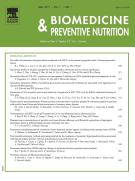Effect of long-term aspartame (artificial sweetener) on anxiety, locomotor activity and emotionality behavior in Wistar Albino rats - 18/02/14

 , Dapkupar Wankhar
, Dapkupar WankharAbstract |
The focus of the study is to investigate whether the long-term (90days) oral administration of aspartame (75mg/kg) has an effect in the anxiety, locomotor activity and emotionality behavior of Wistar strain male Albino rats. Aspartame releases methanol as one of its metabolites during metabolism. To mimic the human methanol metabolism, the methotrexate (MTX)-treated folate-deficient rats were used. Aspartame was administered orally to the MTX-treated animals and was studied along with controls and MTX-treated controls. The locomotor activity and emotionality behavior in the MTX-treated animals did not differ from the controls. However, the aspartame-treated MTX animals showed a marked increase in the immobilization, fecal bolus with a marked decrease in ambulation (peripheral square and central square), rearing, grooming from the control as well the MTX-treated animals. The anxiety state behavior in the MTX-treated animals did not differ from the controls. However, the aspartame-treated MTX animals showed a marked decrease in the number of open arm entry, percentage of open arm entry, time spent in open arm, percentage of time spent in open arm and number of head dips from the control as well the MTX-treated animals. It is relevant to point out that methanol released by aspartame may add an effect in the brain and that could be the additional contributing factor for the observed changes in the locomotor and their anxiety levels. This study intends to substantiate that long-term aspartame consumption can alter the behavior.
Le texte complet de cet article est disponible en PDF.Keywords : Long-term aspartame, Anxiety, Locomotor activity, Emotionality behavior, Rat folate-deficient model
Plan
Vol 4 - N° 1
P. 39-43 - janvier 2014 Retour au numéroBienvenue sur EM-consulte, la référence des professionnels de santé.
L’accès au texte intégral de cet article nécessite un abonnement.
Déjà abonné à cette revue ?

